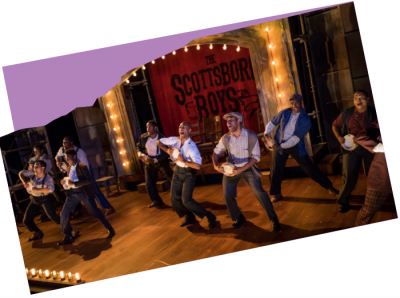Your donation sets the stage for a new season of Boston's most intimate, entertaining and provocative plays and musicals. Our shows make powerful connections with our audiences-- and they are only possible because of you.
Inside appropriate
Inside appropriate

M. Bevin O’Gara
Tuesday, August 18th marked the first rehearsal for the first show of our 25th Anniversary Season, appropriate by Branden Jacobs-Jenkins.
As the actors begin to delve into their characters and the play begins to take shape, we asked Director M. Bevin O’Gara to talk about the questions being explored in the play, and what kind of impact the play will have on its audience.
What attracted you to this play?
I love telling ensemble stories. Directing plays which focus on a great group of characters means I get to spend my nights in rehearsal with a room full of terrific people. Also, I was excited to explore the hilarity of discomfort. This play turns from humor to heartache to disgust on a dime; the world is constantly shifting under our feet.
What type of play is appropriate in your opinion?
Genre is in the eye of the beholder. Only you can gauge what makes you suspend your disbelief. It always surprises me what an audience is willing to go with and what puts them off.
You’ve stated that you like to begin the rehearsal process by asking questions. What are some of the questions appropriate raises that you and the cast are exploring?
What are the sins of the father that are passed down to the next generation? Can you escape your personal and cultural history? What does it mean to be seen from only one perspective? Do ghosts exist? What is the difference between a ghost and a spirit? What makes a villain? What makes a family? What do you have the right to profit from? Who has the right to tell a story?
In this play, the questions raised are more important than learning the truth. It’s exciting to work on a play where we don’t have to answer certain questions. And of course, sometimes, there just aren’t answers.

Imogen Heath.
Playwright Branden Jacobs-Jenkins has said the play was inspired by – and even consists of – bits from many classic family dramas. What are some of the plays referenced in appropriate and how do those references impact one’s experience of the show?
What Branden did was look at all the plays he liked and take or rather “appropriate” bits from many of them into one big stew of a play. There’s a little O’Neill, Shepard, Williams, Letts, Miller, Chekhov, Ibsen, and Albee: something for everybody. Branden takes what they did and then makes it all his own. If you didn’t know that he was “borrowing” from the classic family dramas or aren’t a big theatre geek, you may not even notice the similarities as you watch the play. If you pick up on the references, though, it forces you to question why these particular theatrical traditions are still upheld.
Does it matter that this is an African-American playwright telling a story about race using only white characters? Should it matter?
It shouldn’t matter. But it does. In this country, it still does. Branden is asking questions about how invisible race can be in this country. People make assumptions about his work based on his race. Would O’Neill or Williams ever have been asked what they were trying to say about whiteness in their plays?
What do you hope audiences will take away from this production?
I hope the audience comes away questioning how this family can ever really deal with their mess. Is there any way to deal with such complex histories, personalities, and issues? And I hope that those questions push the audience to ask what messy issues we, as a society, are not dealing with?
 Past Productions
Past Productions PRU PAYNE
PRU PAYNE ain't no mo'
ain't no mo' a man of no importance
a man of no importance JAJA’S AFRICAN HAIR BRAIDING
JAJA’S AFRICAN HAIR BRAIDING




